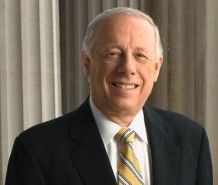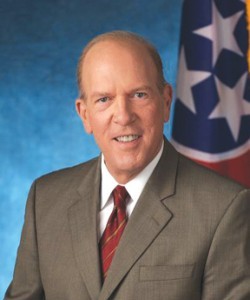 My home state of Tennessee has been solid red for nearly 20 years. So red that it famously spurned Al Gore, its own homegrown political celebrity, in the 2000 presidential election, favoring Dubya by a wide margin. Now President Obama’s popularity is faring even worse in these parts. Recent Tennessee polls estimate the commander in chief’s approval rating at roughly 30 percent. So it’s a curious political paradox that our outgoing Democratic governor, Phil Bredesen, is ending his eight years in office with an approval rating of 72 percent.
My home state of Tennessee has been solid red for nearly 20 years. So red that it famously spurned Al Gore, its own homegrown political celebrity, in the 2000 presidential election, favoring Dubya by a wide margin. Now President Obama’s popularity is faring even worse in these parts. Recent Tennessee polls estimate the commander in chief’s approval rating at roughly 30 percent. So it’s a curious political paradox that our outgoing Democratic governor, Phil Bredesen, is ending his eight years in office with an approval rating of 72 percent.
More surprising than Bredesen’s success at being a blue governor in a red state is that he’s managed to be a successful green governor in a red state. “On energy and the environment, Bredesen is by far the best governor the state has ever seen,” says John Noel, board president of the Southern Alliance for Clean Energy and a top environmental strategist in the Southeast.
 Outgoing Tennessee Gov. Phil BredesenTennessee has had its fair share of environmental troubles, including the catastrophic coal-ash spill at a Tennessee Valley Authority power plant two years ago. TVA is one of America’s dirtiest utilities, and Tennessee’s Great Smoky Mountains National Park is one of our most polluted national parks. But since assuming office in 2002, Bredesen has managed to make significant green progress. In addition to protecting more than 350,000 acres of Tennessee wilderness from development and taking a stand against mountaintop-removal coal mining, Bredesen has helped Tennessee rise to third in the nation for clean-energy job creation, closely trailing Colorado and Oregon. He has lured, quietly and without fanfare, some 20 new clean-energy manufacturing ventures to Tennessee, representing $2.9 billion in investment and creating more than 2,000 jobs producing photovoltaic panels, wind turbines, electric cars, and cellulosic biofuels. All in all, Tennessee has added roughly 130,000 manufacturing jobs under the Bredesen administration, nearly 20 percent of which are green.
Outgoing Tennessee Gov. Phil BredesenTennessee has had its fair share of environmental troubles, including the catastrophic coal-ash spill at a Tennessee Valley Authority power plant two years ago. TVA is one of America’s dirtiest utilities, and Tennessee’s Great Smoky Mountains National Park is one of our most polluted national parks. But since assuming office in 2002, Bredesen has managed to make significant green progress. In addition to protecting more than 350,000 acres of Tennessee wilderness from development and taking a stand against mountaintop-removal coal mining, Bredesen has helped Tennessee rise to third in the nation for clean-energy job creation, closely trailing Colorado and Oregon. He has lured, quietly and without fanfare, some 20 new clean-energy manufacturing ventures to Tennessee, representing $2.9 billion in investment and creating more than 2,000 jobs producing photovoltaic panels, wind turbines, electric cars, and cellulosic biofuels. All in all, Tennessee has added roughly 130,000 manufacturing jobs under the Bredesen administration, nearly 20 percent of which are green.
It may then strike you as ironic that the candidate heavily favored to replace Bredesen in the Nov. 2 election is the former president of Pilot, a Knoxville-based petroleum company that operates a chain of truck-fueling stations. Republican Bill Haslam captained Pilot for 13 years before he was elected mayor of Knoxville in 2003. During his tenure at Pilot, he grew the company, which was founded by his grandfather, from 80 to more than 300 truck stops in 39 states. Pilot has come under environmental fire for racking up 50 state and 20 federal violations of contamination rules for petroleum storage tanks.
 Republican candidate Bill HaslamThe Tennessee race is not much of a contest: Haslam has a 28-point lead over his Democratic opponent, Mike McWherter, a beer distributor with no political experience to speak of, aside from being the son of a former Tennessee governor. Haslam has been outspending the Democrat seven to one.
Republican candidate Bill HaslamThe Tennessee race is not much of a contest: Haslam has a 28-point lead over his Democratic opponent, Mike McWherter, a beer distributor with no political experience to speak of, aside from being the son of a former Tennessee governor. Haslam has been outspending the Democrat seven to one.
David Ewing, a Nashville lawyer and political strategist, says the end of the Bredesen administration coincides with an overall shift to the right in Tennessee politics. “The Democratic party will no longer have a governor in Tennessee after November,” he predicts. “Both United States senators are Republican, and with open seats in Congress, a majority of Tennessee’s delegation in the House will probably also be Republican.” The already conservative Tennessee state legislature is also trending rightward.
This trend does not, on the face of it, bode well for my state’s environmental and energy future. Haslam lists 10 priority issues on his website — “keeping taxes low,” “protecting our second amendment rights,” “conservative fiscal leadership,” and “illegal immigration” among them — and environment, climate change, and energy are nowhere mentioned. For his part, McWherter, who has been endorsed by Bredesen and Bill Clinton, briefly cites the clean energy sector in his job-creation plan, but makes no reference to the environment or the climate.
 Democratic candidate Mike McWherterYou might think green messaging would be more prevalent in a state that that is No. 3 in green-jobs creation nationwide and veritably booming with clean-energy development, but that sort of talk doesn’t sell in Tennessee. Noel put it this way: “If you polled the voters in this state about their position on climate change and environmental issues … well, let’s just say, I’d be afraid to take the poll.”
Democratic candidate Mike McWherterYou might think green messaging would be more prevalent in a state that that is No. 3 in green-jobs creation nationwide and veritably booming with clean-energy development, but that sort of talk doesn’t sell in Tennessee. Noel put it this way: “If you polled the voters in this state about their position on climate change and environmental issues … well, let’s just say, I’d be afraid to take the poll.”
That may explain why, as several high-level state environmentalists have told me, Haslam may actually be downplaying his green sympathies. Though he hails from the oil biz, he seems to recognize the promise of a clean-energy economy. “He’s greener in practice than he seems in message,” said Harvey Abouelata of the group Energy Efficiency of Tennessee. For one thing, Haslam contributed $1,000 to Al Gore’s presidential campaign in 1988. And as mayor of Knoxville, Haslam has made a big push for solar and efficiency. In recent years, 2 megawatts of solar panels have been installed on city buildings — more thanin any other Southeastern city — and Knoxville has earned a Solar America City designation from the U.S. Department of Energy. The energy-saving steps Haslam has implemented on government buildings have reduced the city’s annual energy costs by more than $1 million. He’s also been known to commute to work by bike and recently allocated $20,000 for bike-route improvements.
At the same time, however, Haslam has said almost nothing about climate change (he declined to join more than 1,000 U.S. mayors in signing the U.S. Conference of Mayors Climate Protection Agreement), and he’s put little funding into public transportation.
In a recent interview with Haslam’s campaign manager, Mark Cate, I asked about the candidate’s stance on climate change. Cate danced around the issue, acknowledging global warming as “a concern”; when I pressed him on whether Haslam had outlined a strategy to address climate change, the answer was a flat “no.” It was clear from my interview with Cate that Haslam would not support a state renewable energy standard or greenhouse-gas regulations, and would not participate in a regional cap-and-trade program.
Then again, Bredesen hasn’t pushed for an RES or greenhouse-gas regs either — they’re politically implausible in a state with an increasingly right-leaning legislature. Enviros are holding out hope that what Haslam lacks in climate strategy, he could, like Bredesen, make up for in green-jobs strategy.
Bredesen offered incentives to Nissan to build a giant manufacturing facility outside of Nashville that will produce lithium-ion batteries to power the all-electric Nissan Leaf. An existing Nissan auto-assembly plant in the area will produce the Leaf itself. The two projects represent an investment of $1.7 billion and will create up to 1,300 jobs when both plants are operating at full capacity. To further show his support for the industry, Bredesen is offering $2,500 rebates to the first 1,000 Tennesseans who buy electric cars. The governor also reeled in big-fish solar projects. He helped convince Hemlock Semiconductor and Wacker Chemie, both of which produce the polycrystalline silicone components of solar panels, to build multi-billion-dollar facilities in the state. Meanwhile, Sharp, one of the largest solar producers in the U.S., expanded its already-existing solar-panel manufacturing facility outside of Memphis. The growth of the solar industry in Tennessee has drawn a number of manufacturers of component parts: AGC Flat Glass, which makes glass for solar panels; Shoals, which makes electrical components for solar panels; and Confluence Solar, which makes mono-crystal silicon ingots.
Cate applauded Bredesen’s success with clean-energy industries and suggested that Haslam would carry it forward. “Haslam’s priority is to build the economy of Tennessee,” he said, “and green jobs are an important part of his plan.” But he shied away from making promises or establishing targets for the growth of the clean-energy sector.
The good news is that Bredesen has made the case loud and clear that green really is green — and therefore both red and blue — in Tennessee. If the next governor of our state wants to achieve Bredesen’s 72 percent approval rating, he’ll be smart to continue nurturing and luring cleantech businesses, and keep Tennessee on the frontlines of the new energy economy.




